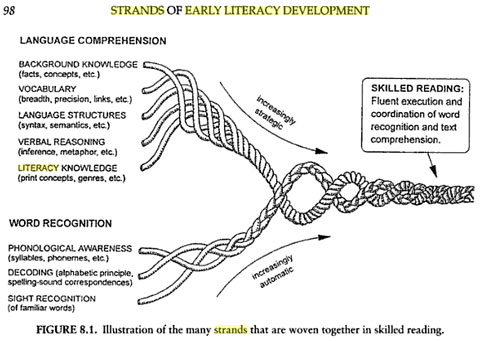I'm at the Lexia Reading Users' Group meeting today!

For those of you not familiar with Lexia Reading, it's a powerful application for developing early reading skills. Lexia uses what is called Response to Intervention, or RTI, to drive instruction with data. I'm here today to speak on their panel regarding successes and challenges of implementation but I wanted to take the chance to post some key messages from the other speakers today.
I'll post updates as we go through the morning, but for now, a quick summary of what Lexia can do. Essentially, beginning as early as students start receiving the most basic instruction in reading, students can begin using Lexia. Lexia doesn't focus so much on the comprehension skills that students develop as they read more and more; rather, it focuses on learning to read and identifying specific areas of difficulties for early readers. In fact, it provides extremely granular data on student strengths and weaknesses and actually changes the presented skill sets based on student responses and input.
As a simple example, when my second-grader started kindergarten, he had a fairly substantial speech impediment. However, because of the nature of the impediment and his overall achievement (which, I'm proud to say, was quite good), it wasn't clear if it would respond to simple speech therapy or if it might have greater impacts on his phonetic skills as he learned to read and write. Between the teacher, the speech pathologist, and data from Lexia, it became clear that his speech issues were directly impacting a few specific areas of literacy. Some shifts to his therapy and instruction made substantial improvements in both his intelligibility and his literacy. Two years later, he's reading at the fourth grade level.
All the credit for this, of course, doesn't go to Lexia. However, tools like Lexia provide important tools for assessing students and differentiating instruction.
More updates to come...
Update at 9:15
A great graphic from the Handbook of Early Literacy Research by Susan B. Neuman and David K. Dickinson. This was presented to us as we looked at the importance of each of the building blocks of literacy:

Update at 9:30 How many kids are just "faking" their reading? These are the kids who know enough to get through or have memorized the look of words without being really fluent readers. We heard a story of a brilliant engineer who made his way through Northeastern and ultimately made millions in technology, but was missing a couple of key skills that allowed him to be really literate. These are the sorts of deficiencies that software like Lexia can identify very early and allow instructors to intervene appropriately.
Update at 10:00 Dr. Liz Crawford, Lexia's Director of Assessment, is speaking about the software. A few key points:
- Lexia can work pre-K to adult (adults will probably be put off by the interface, but the software will work just as well with illiterate adults as it will with early learners)
- "RTI is all about finding the appropriate level of intensity to get students to respond"
Final update I'm coming up on my panel discussion, but the takeaway for me from this morning? Engage teachers in the use of Lexia with all of the included training and instructional materials (full scripted lessons that Lexia suggests for instructors based on the data collected in the software). Lexia isn't cheap, but it is state-of-the-art. The level of data it provides, as well as the logical branching included in the software that pre-teaches, teaches, and re-teaches appropriate to student skills makes it invaluable for teachers looking to inform instruction through RTI.